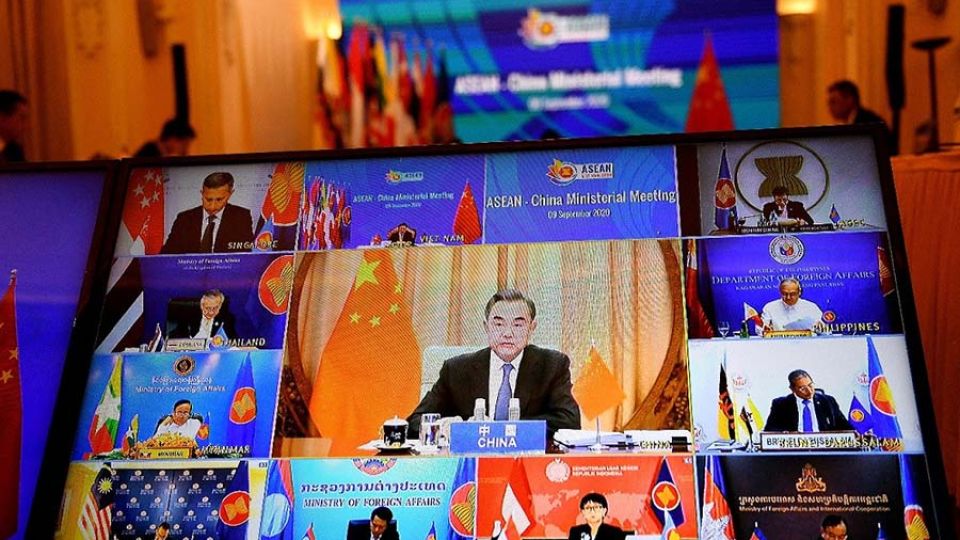November 2, 2022
JAKARTA – A majority of the ASEAN populace feels satisfied with the economic benefits brought by cooperating with China but still feels “anxious” and “distrustful” about Beijing’s political and security policies, a survey by the Foreign Policy Community of Indonesia (FPCI) found on Monday.
The distrust, stemming from China’s perceived lack of commitment to abide by international law, has resulted in a “paradoxical” relationship between the rising superpower and ASEAN, experts explained. The onus is on Beijing, they said, to remedy this skepticism if it wishes to expand its influence in the future.
Over 1,600 respondents from 10 Southeast Asian countries participated in the survey. While students made up more than half of the respondents, “elite” voices were also represented by academia, the business community and civil society groups, analysts said. The responses, while mixed in some aspects, reflected an overarching tone of anxiety and wariness.
The survey found that 68.69 percent of all respondents believed that trade with Beijing was “the most satisfactory area of cooperation”, while defense was ranked first in the category of the “least satisfactory” aspect of China-ASEAN collaboration.
Compared with the United States’ Indo-Pacific strategy and Indo-Pacific Economic Framework (IPEF), an overwhelming majority of participants also stated that Chinese programs – the Belt and Road, Global Development and Global Security initiatives – had made “more contributions for ASEAN”.
“This is the paradox of the ASEAN-China relationship. On one hand, we welcome and relish our close economic [ties]. But there is also an apprehension when it comes to security,” said Renato Cruz de Casto, professor at Manila’s international studies department at La Salle University.
Troubled waters
Beijing’s response to some of the region’s most pressing issues, such as the South China Sea and Mekong River disputes, have been cited as the primary reason for anxiety looming over Southeast Asia. With regard to the statement that “China respects the national unity, sovereignty and territorial integrity of ASEAN countries”, nearly 40 percent of respondents responded with “disagree” or “strongly disagree”.
While 29.19 percent declined to answer, 31.36 percent “agreed” or “strongly agreed” with the idea.
“There is a strong [indication] of skepticism in the satisfaction [rate] for [China’s] cooperation during the consultation of the Code of Conduct [COC],” said Shofwan Al Banna, head of the University of Indonesia’s international relations department.
The South China Sea, an area with an estimated 11 billion barrels of untapped oil and trillions of cubic feet of natural gas, has been disputed by China and several of ASEAN countries – Malaysia, the Philippines, Brunei and Vietnam – since at least the 1970s.
In 2002, ASEAN leaders signed the Declaration on the Conduct of Parties (DOC) in the South China Sea and used various legal mechanisms like the 1982 United Nations Convention on the Law of the Sea (UNCLOS) to resolve the dispute, with only lackluster results. The COC was then drafted, as a follow-up to the DOC, but China’s lack of commitment to the document’s discussion has resulted in a two-decades-long rut.
Another study previously cited the South China Sea as the “most dangerous and riskiest” problem for the region in terms of regional security and economy, as a consequence of the possible trade disruption and the short geographical distance to Beijing, which could prove detrimental for Southeast Asian countries – Indonesia included.
An openness to resolve the South China Sea dispute through diplomatic means would be the ultimate remedy to this “trust deficit” issue, the experts said.
“The litmus test for China is the Code of Conduct. Respecting international law would be a signal to the ASEAN countries that it is willing to have its power constrained by international law,” Cruz de Casto suggested. “It would be a good gesture for China to sit down and finalize the negotiations.
It would go a long way to addressing the distrust issue,” added Endy Bayuni, a seasoned foreign affairs journalist and observer.
The ball is now in China’s court to earn the trust of ASEAN and prove that it will not be unsparing as a hegemon, the panel of experts concurred.
“[Beijing] needs to project the image that it is a benign superpower, not a ruthless one,” Endy said.
‘Holding’ peace
Addressing these concerns in a pre-recorded speech, Chinese Ambassador to ASEAN Deng Xijun emphasized that a deeper relationship between Beijing and the bloc would only “contribute to peace, stability, development and prosperity of the region and the world”.
“China will always be committed to its foreign policy goals of holding world peace and promoting global development,” Deng asserted.
But the world is “entering a new phase of turbulence and transformation”, Deng said, alluding to the fact that resistance from long-existing superpowers has been the primary factor of instability in the world.
“Certain countries put their own hegemonic interests above the common interest, […] blatantly pursuing their own priorities at the expense of others. […] They gang up and stir up trouble,” he claimed.
“[These] external environments [have caused] China-ASEAN relations [to be] full of risks and challenges.”


